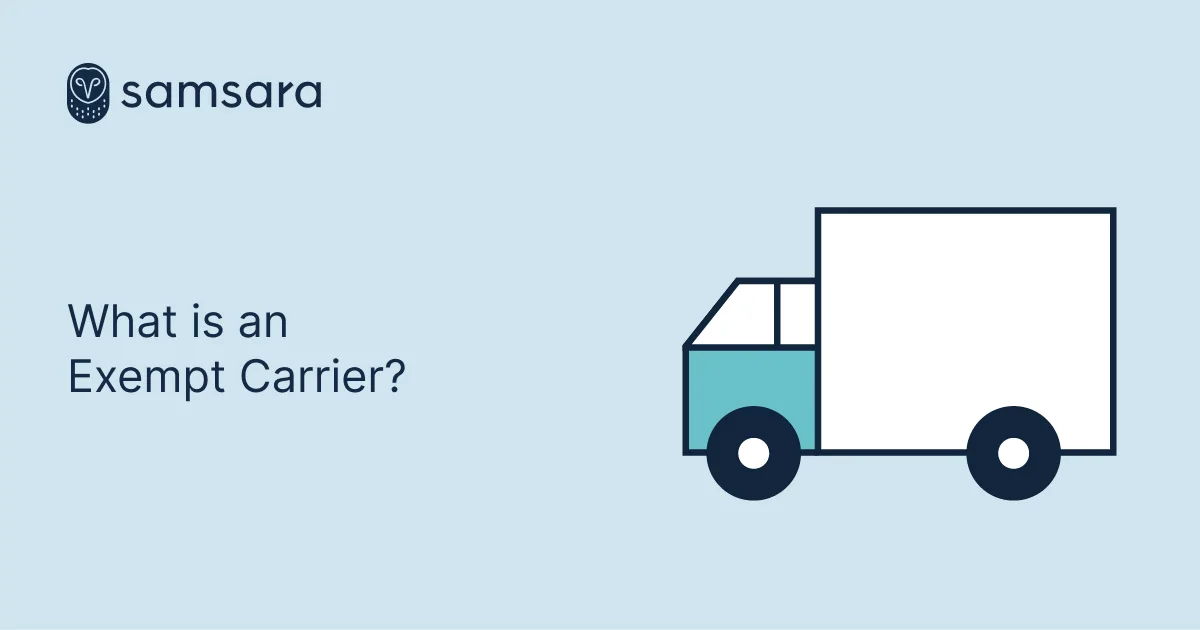What is an Exempt Carrier?
October 22, 2021

Get Started With Samsara
Check Our PricesKey Takeaways
Exempt carriers specialize in taxi services or transporting goods considered exempted commodities (goods that aren’t federally regulated). Unlike their non-exempt counterparts, exempt carriers are not subject to as many restrictions or regulations. They do not need to have operating authority, an MC number, or have certain insurance requirements. Learn more about exempt carriers.
What is an exempt carrier?
An exempt carrier is a company that specializes in taxi services or transporting exempted commodities. These carriers are exempted from economic regulation by the Interstate Commerce Act. Simply put, exempt carriers are companies that transport people or cargo that isn’t federally regulated.
For a partial list of exempt and non-exempt commodities, refer to Administrative Ruling 119.
Congress originally enacted the Interstate Commerce Act to regulate the growing railroad monopoly. It also established the Interstate Commerce Commission (ICC) to oversee and enforce regulations.
Over time, Congress passed amendments to regulate other forms of transportation. These included common carriers such as trucking and bus transportation. Being exempt from the Interstate Commerce Act allowed simple services and businesses to operate without the interference of oppressive government regulations.
Congress abolished the ICC in 1995. The Surface Transportation Board and the Federal Motor Carrier Safety Administration (FMCSA) now oversee many regulatory functions.
Examples of exempt carriers
The most common exemptions are motor carriers that specialize in passenger transportation. These include taxicabs, school buses, and farm vehicles.
Other exempt carriers include:
Motor vehicle transporting only school children and teachers to or from school;
Motor vehicle providing taxi service;
Hotel shuttles transporting hotel guests between the hotel and the local station of a carrier;
Motor vehicles controlled and operated by farmers transporting agricultural commodities and supplies;
Motor vehicles controlled and operated by a cooperative association;
The transport of ordinary livestock, agricultural or horticultural commodities, exempted commodities, cooked or uncooked fish, livestock and poultry feed, and agricultural seeds and plants;
Motor vehicles used to distribute newspapers;
The transportation of passengers by motor vehicle incidental to transportation by aircraft, transportation of property (including baggage), and the transportation of property by motor vehicle instead of of transportation by aircraft because of adverse weather conditions or mechanical failure of the aircraft;
Motor vehicles used in a national park or national monument;
Motor vehicles carrying up to 15 people in a single, daily roundtrip to commute to and from work;
Transporting used pallets, empty shipping containers, and other used shipping devices;
The transportation of natural, crushed, vesicular rock to be used for decorative purposes;
Transporting wood chips;
Brokers for motor carriers of passengers
Transporting broken, crushed, or powdered glass;
Passenger motor vehicles operated by youth or family camps that provide recreational or educational activities
It’s important to note that “exempt” only applies to federal operating authority. Also, exempt carriers are subject to other U.S. Department of Transportation (DOT) regulations. This includes safety regulations, weight limits, vehicle licensing, and fuel tax requirements.
What are non-exempt carriers and commodities?
The U.S. federal government has deemed certain commodities to be non-exempt. Carriers that transport these items must comply with economic regulations. See non-exempt commodities here.
For-hire carriers of non-exempt goods are required to get an operating authority (MC number) in addition to their DOT number. There’s different kinds of operating authorization, so check with the FMCSA to figure out which credentials are needed. To get this authority, they must use the Unified Registration System online. DOT also requires most for-hire carriers to hold specific types of insurance to protect themselves and customers.
What are exempt “for-hire” carriers?”
Exempt for-hire carriers transport exempt or unregulated property owned by others for compensation. Typically, exempt commodities include unprocessed goods, fruits and vegetables, and other small value items.
Exempt for-hire carriers do not have to follow the same regulations to stay in compliance. For example, carriers that exclusively haul exempt commodities don’t need to have operating authority or an MC (motor carrier) number. They also don’t need to get the same types or levels of insurance coverage.
Most states still have registration requirements for exempt interstate and intrastate operations. Further, commodities considered ‘exempt’ from federal economic regulation might not be considered exempt in interstate transportation. Intrastate operators should check local laws.